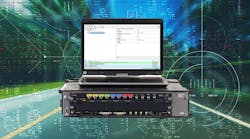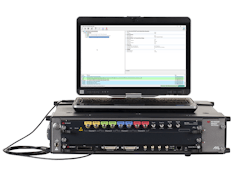Automotive Test Solution Verifies MIPI A-PHY for Broadscale Interoperability
What you’ll learn:
- What is the Mobile Industry Processor Interface?
- The importance of compliance test to ensure interoperability.
Engineers face many pressures when tasked with the design of next-generation mobility solutions. The automotive industry is especially impacted, because a modern car not only needs to integrate with the municipal and interstate traffic infrastructure, it also must integrate with the consumer cloud environment. Ensuring system interoperability at all levels is a challenge all vehicle designers must meet going forward, and proper compliance test is key to achieving that goal.
When it comes to portable wireless products, the Mobile Industry Processor Interface (MIPI) standard defines industry specifications for mobile devices. The MIPI standard is divided into three physical-layer (PHY) types: MIPI D-PHY, M-PHY, and C-PHY. The MIPI D-PHY and C-PHY physical layers apply to basic device apps, while more advanced solutions are supported on top of the M-PHY layer.
Promoted and managed by the MIPI Alliance, an industry group, MIPI Alliance specifications address the interface requirements of application processors and peripherals. MIPI-compliant products serve network technologies such as GSM, CDMA2000, WCDMA, PHS, TD-SCDMA, among others.
Compliance Test
Recently, an automotive serializer/deserializer (SerDes) receiver compliance test solution was released by Keysight Technologies to verify MIPI-compliant A-PHY devices (see figure). Based on the Compliance Test Specification (CTS) requirements, the solution was created with BitifEye Digital Test Solutions and Wilder Technologies, along with Valens Semiconductor.
As vehicles are continually being enhanced with autonomous functionality, it’s important to ensure that the data gathered and used by its systems are done so accurately, with precision, reliability, and speed. The receiver compliance test solution recreates a compliant transmitter, which can generate controlled issues like a distorted signal, enabling analysis of its impact on the receiver’s ability to operate properly.
The solution allows automakers and their suppliers, engineers, and system integrators to thoroughly test the receiver to validate its performance in the electronically noisy and harsh environment of a vehicle interior.
Key features include a comprehensive test framework to identify the margin at which a device under test (DUT) is working, a fixture that couples the noise to an active link to stress the receiver, and an arbitrary waveform generator. In addition, test software from BitifEye Digital Test Solutions complements Keysight’s product portfolio to enable highly integrated and automated application-specific test systems.


